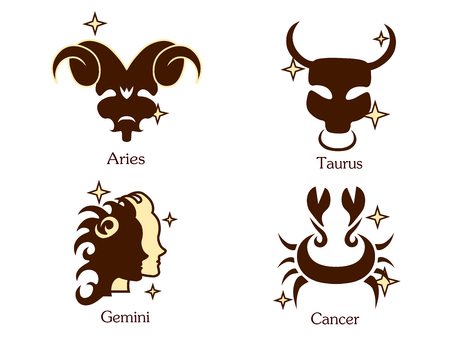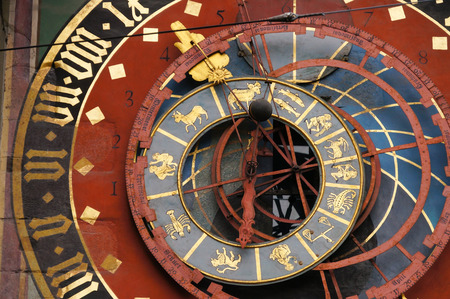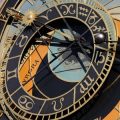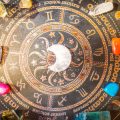1. The Rise of TV Astrologers: From Hocus-Pocus to Prime Time
Once upon a time, astrologers in Britain were the sort of people you’d consult only if your tea leaves looked a bit suspicious or your mum’s friend’s cousin insisted Mercury was ruining her love life. Fast forward to the age of colour television, and suddenly these cosmic interpreters hip-swivelled their way from the mystical fringes to the very heart of British living rooms. No longer relegated to dusty corners of tabloid newspapers, TV astrologers found themselves nestled comfortably between the weather forecast (50% chance of rain, 100% certainty) and a passionate debate about soggy bottoms on Bake Off. With a flick of a chart and a twinkle in their eye, they transformed horoscopes from hocus-pocus into prime time spectacle. In true British fashion, what began as eyebrow-raising entertainment soon became national ritual—because nothing says “start your day right” like knowing Venus is about to mess with your commute.
2. Cultural Quirks: Astrology and the Great British Public
Let’s face it: if there’s anything the average Brit loves more than a proper cup of tea, it’s consulting the stars for cosmic validation—preferably before they’ve even finished their morning toast. But why does astrology nestle so comfortably in the very heart of Blighty, right next to fish, chips, and an umbrella that’s never quite up to the job? The answer lies somewhere between tradition, telly, and a national fondness for queuing up for one’s destiny.
The Horoscope Habit: A National Pastime
Astrology has become as British as grumbling about the weather or pretending not to care about Eurovision results. For generations, astrologers on TV have offered daily doses of celestial wisdom with all the gravitas of a royal wedding commentator. Whether you’re a die-hard Capricorn or just someone who likes to know if Mercury is going to retrograde your train commute into oblivion, the allure remains irresistible.
Why Brits Love Their Horoscopes
| Reason | Cultural Explanation |
|---|---|
| Weather Obsession | If you can’t predict the rain, at least try your luck with Venus. |
| Polite Small Talk | A safe topic that offends no one (except maybe stubborn Scorpios). |
| Escapism | When reality serves mushy peas, sometimes you need Uranus for hope. |
| Media Tradition | TV astrologers are as established as Ant and Dec. |
| Cuppa Companion | No better way to spill tea than while checking your rising sign. |
Fish, Chips & Fate: A Seamless Blend?
Some might argue that astrology is simply another quirky import like chicken tikka masala—but let’s be honest, it fits in perfectly with Britain’s love for comforting routines and gentle eccentricity. Where else can you find someone earnestly checking their horoscope while sheltering from drizzle under a broken brolly, clutching a steaming bag of chips? Only here do horoscopes offer reassurance that “today will be challenging” (translation: bring an extra jumper and patience for train delays). Astrology on British television isn’t just entertainment—it’s woven into the nation’s daily rituals, right there with moaning about the price of Freddos and knowing exactly what time EastEnders starts. If you want to understand the British public, look no further than what star sign they blame for their questionable life choices this week.

3. Media’s Star Power: Crafting the Celestial Narrative
If you think astrology is all about dusty old charts and people whispering about Mercury’s retrograde in hushed tones, you clearly haven’t witnessed British television’s production prowess. Here, horoscope segments are given more sparkle than a Strictly Come Dancing finale. Producers wield their editorial wands with such finesse that even the most mundane prediction—“You may feel hungry around lunch”—gets delivered with a dramatic pause and a crescendo of celestial synths. It’s no longer just about whether your star sign fancies a bit of luck; it’s about making viewers believe that a lunar eclipse could be responsible for everything from train delays to your favourite biscuit running out at Tesco.
Editorial teams, those unsung heroes of TV magic, work overtime polishing astrologers’ words until they shine brighter than Ant and Dec’s foreheads under studio lights. Every forecast gets a sprinkle of relatability (“Geminis: avoid online arguments today!”) and a dash of meme potential (“Capricorns, avoid major life decisions before your second cup of tea”). The result? Predictions so delightfully OTT that they’re practically begging to go viral faster than you can say ‘Saturn return’ on Twitter. And let’s not forget the graphics—animated planets swooshing around like they’ve had one too many at the pub, turning every horoscope into an Oscar-worthy performance.
In short, British TV doesn’t just broadcast astrology; it supercharges it into pop culture gold. Whether you’re a sceptic or someone who plans their entire week based on what Mystic Meg said after EastEnders, there’s no denying the media’s role in crafting a celestial narrative that shapes public opinion—and memes—at warp speed.
4. Star Signs Go Mainstream: Astrologers as Pop Culture Icons
Once upon a time, only your eccentric aunt or the woman who ran the local crystal shop could name a TV astrologer. Fast forward to present-day Britain, and these stargazing oracles are household names—dare we say, more recognisable than half the Cabinet. With catchphrases that rival reality TV contestants and wardrobes shinier than a Love Island contestant’s teeth, British TV astrologers have become bona fide pop culture icons.
Spotlight on Iconic British TV Astrologers
| Astrologer | Signature Style | Cultural Impact |
|---|---|---|
| Russell Grant | Sequins & Jazz Hands | Brought astrology into morning telly; made horoscopes more fun than breakfast cereal. |
| Mystic Meg | Crystal Balls & Velvet Capes | Became a lottery legend; made “Mystic” an actual career aspiration for Gen Z. |
| Jonathan Cainer | Sensible Cardigans (but deeply cosmic vibes) | The go-to daily horoscope guru; his predictions were discussed in pubs as seriously as football scores. |
The Trendsetting Power of British TV Astrologers
Let’s be honest: no one saw sequined robes making a comeback outside of Strictly Come Dancing, but here we are. Whether it’s Mystic Meg’s capes or Russell Grant’s unapologetic sparkle, these celestial tastemakers have left their mark not just on our star charts but also our high streets. Suddenly, “astro-chic” is a thing, and moon-shaped earrings are selling faster than vegan sausage rolls.
Their Influence in Numbers
| Pop Culture Element | Pre-Astrologer Boom | Post-Astrologer Boom |
|---|---|---|
| Cape Sales (UK) | A niche Halloween treat | Year-round fashion statement (and not just in Glastonbury) |
| Horoscope Columns in National Papers | 1-2 per paper, mostly ignored by sceptics | Pulled out and read before the front page—every day, without fail. |
| Sequinned Robe Sightings on Public Transport | Rare (unless you’re on the night bus) | Now considered “business casual” during Mercury retrograde. |
More Influential Than Politicians?
If you think this is all tongue-in-cheek exaggeration, ask yourself: when was the last time you quoted a Chancellor of the Exchequer over breakfast? Now compare that to how often you’ve heard someone mention “Mercury in retrograde” as the reason for missing their train—or forgetting their Oyster card. British TV astrologers have shaped not just our pop culture but our very excuses for everyday mishaps. And honestly? We wouldn’t have it any other way.
5. Criticism, Scepticism, and the British Art of Taking the Micky
If there’s one thing the British public loves almost as much as a good cup of tea, it’s a healthy dose of scepticism—especially when it comes to astrologers on television. Let’s face it, while some are clutching their pearls over Mercury retrograde, others are busy sharpening their wit (and maybe their pencils) for a bit of banter at the expense of televised star-gazers.
Unpacking the Sceptics: Britain’s Favourite Party Poopers
The sceptical brigade in Britain is never short of volunteers. There are your garden-variety doubters who treat horoscopes with about as much seriousness as supermarket own-brand gin. Then you’ve got the high-brow intellectuals—let’s call them ‘cosmic snobs’—who see astrology as little more than “mumbo-jumbo for the masses.” Their natural habitat? Radio 4 panel shows and Guardian comment sections, where they can safely roll their eyes without fear of Saturn’s wrath.
The National Pastime: Mockery with a Side of Affection
But here’s the twist: making fun of astrology is itself practically a national pastime, right up there with queueing or moaning about the weather. From comedians on late-night telly to cheeky tabloid headlines, lampooning TV astrologers isn’t just accepted—it’s cherished. Yet, in true British fashion, this mockery often comes served with a generous helping of affection. After all, who hasn’t secretly checked if Jupiter is responsible for that dodgy Wi-Fi?
Why Mock When You Can Read?
It’s not uncommon for Brits to scoff at televised horoscopes—and then immediately turn the page to read their own star sign predictions, “just for a laugh.” It’s this paradox that gives astrology its enduring place in UK pop culture: it may be nonsense (or so we claim), but it’s our nonsense. Poking fun at TV astrologers is as much a part of British life as actually watching them, making sure neither takes themselves too seriously—a philosophy perhaps written in the stars.
6. The Future in the Stars: Where Do We Go From Here?
Let’s be honest: as we gaze into the celestial crystal ball (which, let’s face it, is probably just a glittery snow globe from Blackpool Pier), one has to wonder whether astrologers on British television will continue to sparkle like sequins on a Strictly contestant, or if they’re doomed to shuffle off into obscurity alongside Spangles, Woolworths, and other dearly departed icons of yesteryear. Will future generations tune in eagerly to see what Jupiter retrograde means for their soggy commute, or will astrology become yet another punchline at pub quizzes and dinner parties?
The British have always had a soft spot for eccentricity—a nation that gave the world both Monty Python and Mystic Meg clearly loves a bit of cosmic chaos with its cuppa. Yet, with streaming platforms multiplying faster than Geminis change their minds, will today’s horoscope-lovers swap telly psychics for astrology TikTokers and Instagram star-chart influencers? Or is there still a place on the telly schedule between Antiques Roadshow and the latest crime drama for a good old-fashioned forecast involving Saturn’s mood swings?
Let’s not forget: TV astrology has an uncanny knack for reinvention. Just when you think it’s finally faded like a forgotten B-side at Glastonbury, along comes another charming soothsayer promising viewers fame, fortune, or at least a reason not to talk about the weather. Perhaps in ten years’ time, we’ll all be watching holographic horoscopes projected onto our toast while Alexa analyses our rising sign (and judges us for it).
Ultimately, whether TV astrologers remain beloved national treasures or become the stuff of nostalgic ‘90s retrospectives is written—if not in the stars—then certainly in the unpredictable tastes of the British public. As long as there are people willing to blame Mercury retrograde for sending their emails to the wrong boss, there’s hope yet for our televised stargazers.
So, where do we go from here? Only time (and perhaps Uranus) will tell. But if British telly has taught us anything, it’s that nothing ever really disappears—it just comes back in fancy dress for a Christmas special.


